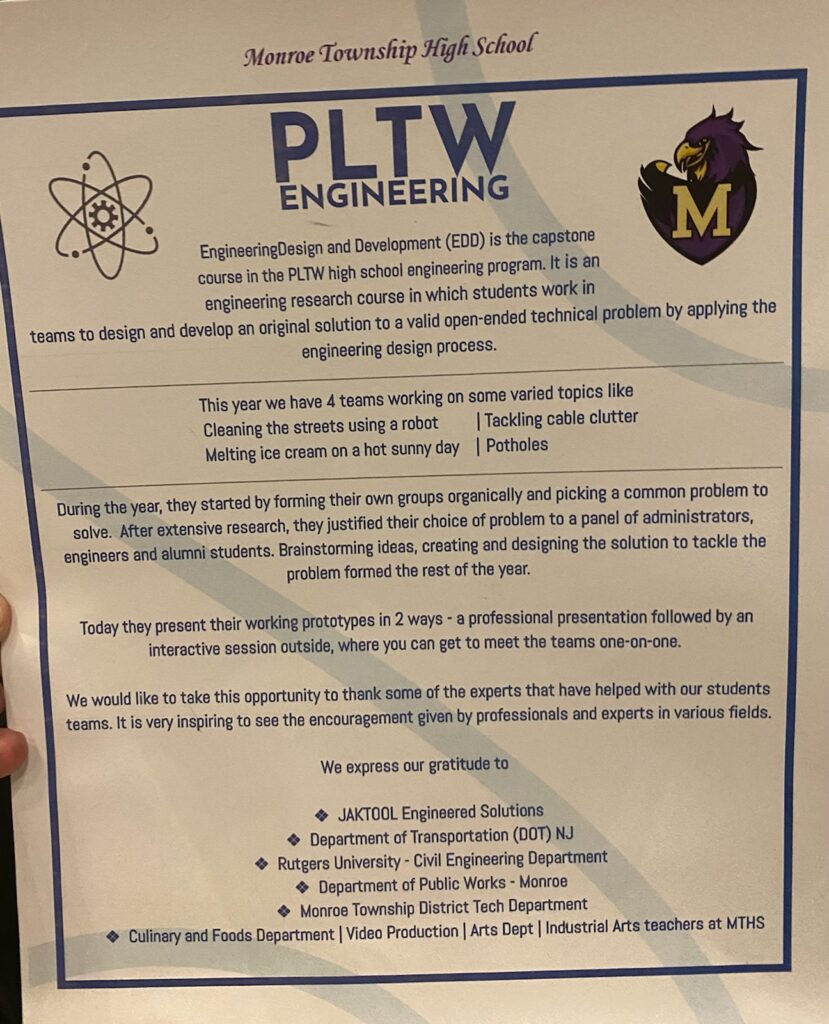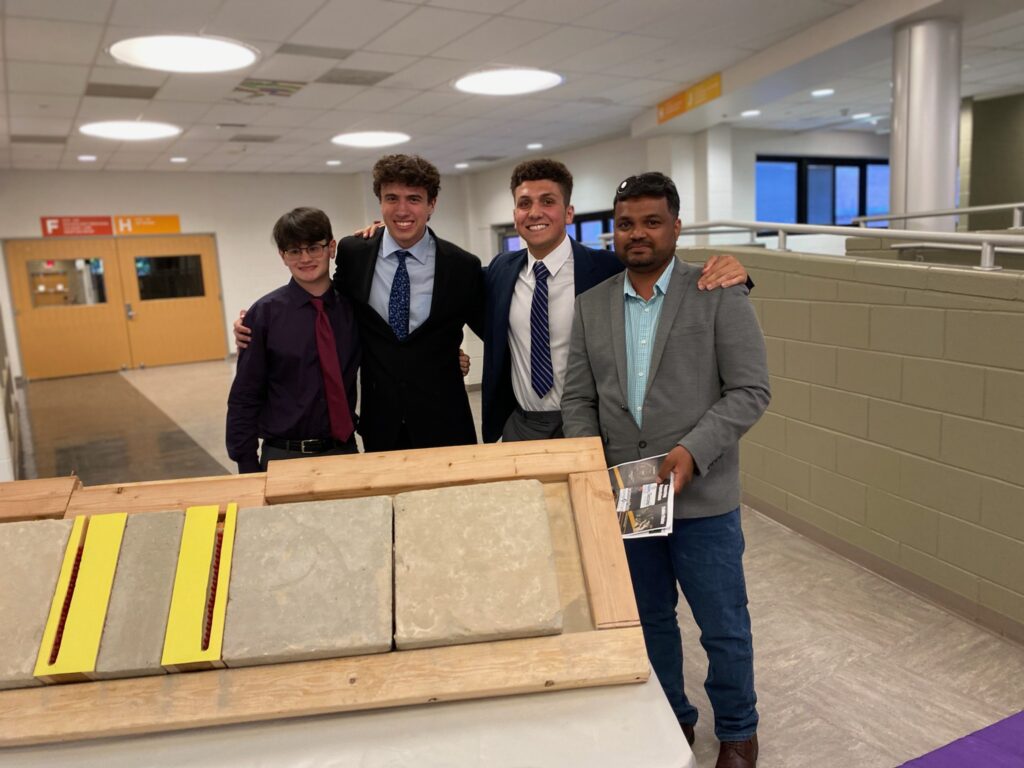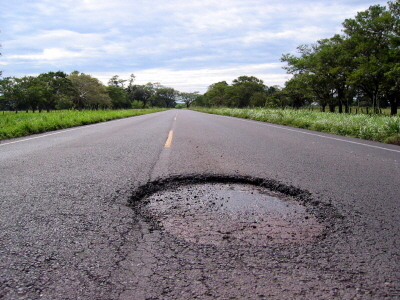As a part of the New Jersey Department of Transportation (NJDOT)’s Commitment to Communities, three Monroe Township High School students received assistance with their senior capstone project from NJDOT Bureau of Research (BoR) research scientist, Dr. Giri Venkiteela. The capstone project was undertaken as a part of the Project Lead the Way program which seeks to incorporate hands-on STEM projects into primary and secondary education across the country. The specific aim of these students’ project was to improve the processes for pothole repair in the area. Maintenance of roadways with potholes is an important aspect of transportation infrastructure particularly because potholes can grow or crack and damage roads further if left unresolved.
The students employed a survey of local residents to investigate the relative state of road conditions in Monroe and familiarized themselves with research relating to road maintenance and design. They engaged with subject matter experts from Rutgers University, the BoR, and other stakeholders who helped the students hone the depth and direction of their capstone. We spoke with Dr. Venkiteela about this mentorship process and what the future may hold for this project and the team behind it.
Background
Q. What is your role at the NJDOT’s Bureau of Research? How did BoR and NJDOT become involved in mentoring the Monroe Township High School students?

Project Lead the Way capstones at Monroe Township High School. Courtesy of NJDOT Bureau of Research.
I am a research scientist and a subject matter expert (SME) in structural design, technology transfer, and pavement materials among other areas at the NJDOT Bureau of Research. The students reached out to the NJDOT Commissioner by email to request help because they were trying to find solutions to a transportation issue – pothole repair. The Commissioner then assigned me to coordinate with the students and engage with other relevant SMEs to lend assistance. We had a couple of back and forth meetings to get the students connected, and that is how everything started.
Q. To what degree did mentoring Monroe high school students with their Project Lead The Way engineering capstone reflect the Bureau of Research’s mission?
It is the mission of the Bureau, and of the state-wide Department, to help communities, students, universities, and the wider public engage with transportation topics. Beyond the innovations and assistance that such engagements yield back to us as an organization, it is our aim to benefit residents and stakeholders as much as possible. Mentoring the Monroe high school students reflects this aspect of the agency’s “Commitment to Communities” and helps cultivate the next generation of engineers.
Q. Could you describe the capstone project the students undertook?
The students produced a survey targeted to local drivers about the state of potholes in the Monroe area. The students also spoke with individuals, agencies, and local organizations in order to come up with solutions to improve pothole repair processes. The students combined the quantitative information from their survey with more qualitative interviews from key stakeholders and SMEs for their final presentation and capstone project.
Project Outcomes
Q. We understand that you helped get the students in touch with Rutgers and NJDOT SMEs in mentoring these students. Could you describe that mentoring? In what ways did this mentoring encourage, direct, or otherwise support their project?
Beyond facilitating the students’ contact with experts, NJDOT and I helped them sharpen the focus and direction of their project. After they designed and conducted their survey, for instance, we asked them to come up with the three core ideas they might want to explore further. The SMEs and I looked at these ideas, and we provided additional feedback and comments on them, so the students could make a final decision on how to proceed with the project.

Research Project Manager, Dr. Giri Venkiteela, with the three Monroe Township High School Students. Courtesy of NJDOT Bureau of Research
The students definitely aimed high with their project, but I would say part of the mentoring process was supporting their ambitions with advice on the practical, feasible side of the capstone that could lead them to successfully carrying out their vision. We found there was a fine line between providing this type of feedback and not discouraging the students. I also tracked their progress to make sure I could offer support as they moved along with their project.
Q. What were some of the most interesting findings from the students’ capstone/survey?
The students originally wanted to eliminate the potholes that can form in asphalt roads by using concrete slabs equipped with sensors. As the students imagined it, these sensors would detect cracks or physical depressions occurring in the roads’ concrete and report it for repair. When the SMEs and I reviewed their idea though, we made them aware that it is not practical to use concrete in all of the roads that we might be interested in because of freezing and thawing and other conditions affecting the roads. Their ideas might be applied to smaller road sections or local roads. The students learned why roads are built out of the materials they are: this kind of learning was interesting to engage with.

A large pothole forming cracks in the surrounding surface of a road. Source: Wikimedia Commons.
All the same, I would say placing the sensors in the pavement itself was a very interesting idea. It is a good, creative approach that was interesting to discuss for their capstone.
Q. What are your thoughts on the educational benefits of capstone projects for secondary education or beyond? In what ways do you feel the capstone might have benefited the students’ academic and professional development?
Beyond the outcome of a capstone project itself, these types of projects facilitate critical thinking. Exposure to a large organization like NJDOT and the practical side of engineering problem solving will help their career and intellectual development wherever they go or whichever field they specialize in. The hands-on experiences of coming up with solutions to specific problems, prototyping, and working in labs are incredibly valuable.
Flyer describing the Capstone team’s project, “The Pothole Solution Project”, and contacts
Source: Courtesy of NJDOT Bureau of Research
One of the most important things I saw personally was that the students are very interested in their presentation skills. I was so impressed, actually; I can imagine once they reach the college or postgraduate level, they will be able to express their thoughts and findings remarkably well. That aspect of their development is core to becoming a scientist, engineer, educator, or who knows. There are so many things they will be able to choose from with the skills fostered by this educational process.
Next Steps
Q. What are the next stages for their project and its findings? Have any public or nonprofit entities (such as local governments, NJDOT, or neighborhood groups) taken notice of it?
Absolutely, in a certain sense the NJDOT has already taken interest with my involvement. For high school students working on a project like this, however, the next steps are complicated since we do not know if they are going to specialize in college in computer science, civil engineering, materials engineering, etc. If we were certain the students were going into civil engineering with their academic and professional futures, we could endeavor to keep them in the loop, but having spoken to the students, their interests and futures are likely to be varied. One is heading into environmental studies for a college major, another will be a computer sciences major, and one will do civil engineering.
We definitely encourage them to continue reaching out to us with their ideas with pothole repair — it is a major issue within transportation. Though it is, of course, impossible to eliminate one hundred percent of potholes, the next generation will come up with the solutions to this wider concern.
Q. Do you think it may prompt or support future studies/capstones?
Though the current students are graduating from high school and going in their own directions for college, next year’s students could continue this project and the progress these students have achieved. I could see friends of different graduating years passing on some of the efforts from previous capstones and building on one another. NJDOT, and I personally, would be glad to participate in future capstone projects and to serve the broader community in this way.

